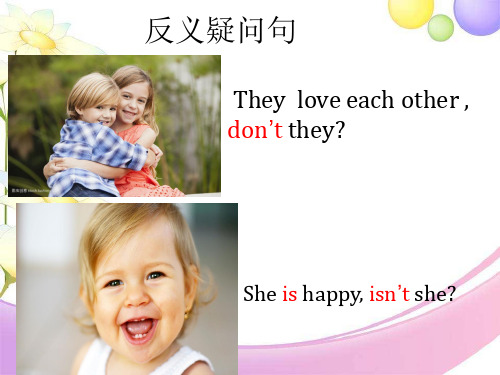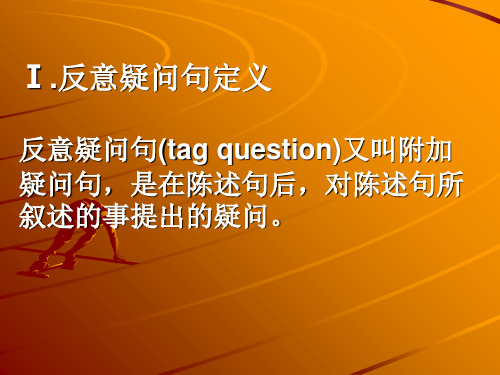英语反义疑问句ppt
合集下载
反义疑问句(共14张PPT)

+ You have to believe in yourself. That's the secret of success. 人必须相信自己,这是成功的秘诀。
+
特殊用法2-----There be 句型
陈述部分是“there be”结构时,疑问部分用be there。
There is something wrong with your watch, isn't there?
Summary
一、反义疑问句的结构: 前肯+后否 ;前否+后肯
二、反义疑问句的四种特殊用法 1、祈使句的反义疑问句 2、There be 句型的反义疑问句 3、陈述部分有hardly等词时,提问用肯定形式。 4、反义疑问句的回答(根据事实)
Thanks for listening! Goodbye!
Chinese,_c_a_n___h_e___? 6.Please call me,_w__o_n_’t_y_o_u__?
7.Let’s go home, s_h__a_l_l_w__e__ ?
8.Let us go home,w__i_l_l_y_o__u__?
9.Don’t play on the road,w__i_l_l_y__o_u_?
2、Let‘s 开头的祈使句,后用shall we? 而Let us 开 头的祈使句,后用will you ?
+9、要学生做的事,教职员躬亲共做;要学生学的知识,教职员躬亲共学;要学生守的规则,教职员躬亲共守。2024/3/72024/3/7Thursday, March 07, 2024 +10、阅读一切好书如同和过去最杰出的人谈话。2024/3/72024/3/72024/3/73/7/2024 1:35:33 PM +11、只有让学生不把全部时间都用在学习上,而留下许多自由支配的时间,他才能顺利地学习……(这)是教育过程的逻辑。2024/3/72024/3/72024/3/7Mar-247-Mar-24 +12、要记住,你不仅是教课的教师,也是学生的教育者,生活的导师和道德的引路人。2024/3/72024/3/72024/3/7Thursday, March 07, 2024
+
特殊用法2-----There be 句型
陈述部分是“there be”结构时,疑问部分用be there。
There is something wrong with your watch, isn't there?
Summary
一、反义疑问句的结构: 前肯+后否 ;前否+后肯
二、反义疑问句的四种特殊用法 1、祈使句的反义疑问句 2、There be 句型的反义疑问句 3、陈述部分有hardly等词时,提问用肯定形式。 4、反义疑问句的回答(根据事实)
Thanks for listening! Goodbye!
Chinese,_c_a_n___h_e___? 6.Please call me,_w__o_n_’t_y_o_u__?
7.Let’s go home, s_h__a_l_l_w__e__ ?
8.Let us go home,w__i_l_l_y_o__u__?
9.Don’t play on the road,w__i_l_l_y__o_u_?
2、Let‘s 开头的祈使句,后用shall we? 而Let us 开 头的祈使句,后用will you ?
+9、要学生做的事,教职员躬亲共做;要学生学的知识,教职员躬亲共学;要学生守的规则,教职员躬亲共守。2024/3/72024/3/7Thursday, March 07, 2024 +10、阅读一切好书如同和过去最杰出的人谈话。2024/3/72024/3/72024/3/73/7/2024 1:35:33 PM +11、只有让学生不把全部时间都用在学习上,而留下许多自由支配的时间,他才能顺利地学习……(这)是教育过程的逻辑。2024/3/72024/3/72024/3/7Mar-247-Mar-24 +12、要记住,你不仅是教课的教师,也是学生的教育者,生活的导师和道德的引路人。2024/3/72024/3/72024/3/7Thursday, March 07, 2024
完整反义疑问句课件

如果陈述句是肯定的,反义疑问句应该是否定的。
2 人称一致
陈述句和反义疑问句中的主语和动词人称要保持一致。,避免使用复杂的句子结构。
结束语
通过学习反义疑问句的结构和用法,我们可以更好地理解和运用这个表达方 式,提升我们的语言表达能力。
完整反义疑问句PPT课件
PPT介绍反义疑问句
什么是反义疑问句?
反义疑问句是指一种用于提问或表示疑问的句子结构,通常由一个陈述句和一个反义疑问句构成。
反义疑问句的结构
1
陈述句部分
包含陈述句的主谓宾结构
2
反义疑问句部分
由一个助动词和一个否定词构成
3
连接词
连接陈述句和反义疑问句的部分,常用的连接词包括but和yet
反义疑问句的语气和语调
语气
反义疑问句通常用于表示疑问、请求或强调某 种认可的语气。
语调
反义疑问句通常以升调结尾,以引起对方的回 答或注意。
反义疑问句的用法与例句
询问意见
这个计划听起来很好,不是吗?
表示认可
你很喜欢这部电影,对吗?
确认信息
你不会去参加聚会,对吗?
反义疑问句的注意事项
1 肯定陈述,否定反义疑问
2 人称一致
陈述句和反义疑问句中的主语和动词人称要保持一致。,避免使用复杂的句子结构。
结束语
通过学习反义疑问句的结构和用法,我们可以更好地理解和运用这个表达方 式,提升我们的语言表达能力。
完整反义疑问句PPT课件
PPT介绍反义疑问句
什么是反义疑问句?
反义疑问句是指一种用于提问或表示疑问的句子结构,通常由一个陈述句和一个反义疑问句构成。
反义疑问句的结构
1
陈述句部分
包含陈述句的主谓宾结构
2
反义疑问句部分
由一个助动词和一个否定词构成
3
连接词
连接陈述句和反义疑问句的部分,常用的连接词包括but和yet
反义疑问句的语气和语调
语气
反义疑问句通常用于表示疑问、请求或强调某 种认可的语气。
语调
反义疑问句通常以升调结尾,以引起对方的回 答或注意。
反义疑问句的用法与例句
询问意见
这个计划听起来很好,不是吗?
表示认可
你很喜欢这部电影,对吗?
确认信息
你不会去参加聚会,对吗?
反义疑问句的注意事项
1 肯定陈述,否定反义疑问
新概念英语第三册反义疑问句课件

It must have rained last night, did’t it?
昨晚一定下雨了,是吗?
②主语+must have done, haven’t +主语?
(无明显过去的时间)
It must have rained, hasn’t it?
一定下雨了,是吗?
特别注意(2):ought to
There is a cup on the table, isn’t there?
桌上有一个杯子,不是吗,不是吗?
3.陈述部分主语为指示代词,疑问部分主语用it/they
This is a book, isn’t it?
this/that→it
这是一本书,不是吗?
These are your friends , aren’t they?
(be动词与主语保持一致)
He must be an actor, isn’t he?
他一定是个演员,不是吗? They must be friends, aren’t they? 他们一定是朋友,不是吗?
2.对过去的推测
①主语+must have done, didn’t +主语? (有明显过去的时间)
这谁也不怨,对不对?
Everyone is having a good time, aren’t they?
每个人都玩的很开心,不是吗?
5.陈述部分主语为复合不定代词(物)疑问部分主语 用it.
Everything is ready. Isn’t it ?
一切都准备好了。是吗?
something, anything,nothing, everything等
陈述部分ought to,疑问部分 should’t/oughtn’t He ought to know what to do, oughtn’t/shouldn’t he? 他应该知道该做什么,不是吗?
昨晚一定下雨了,是吗?
②主语+must have done, haven’t +主语?
(无明显过去的时间)
It must have rained, hasn’t it?
一定下雨了,是吗?
特别注意(2):ought to
There is a cup on the table, isn’t there?
桌上有一个杯子,不是吗,不是吗?
3.陈述部分主语为指示代词,疑问部分主语用it/they
This is a book, isn’t it?
this/that→it
这是一本书,不是吗?
These are your friends , aren’t they?
(be动词与主语保持一致)
He must be an actor, isn’t he?
他一定是个演员,不是吗? They must be friends, aren’t they? 他们一定是朋友,不是吗?
2.对过去的推测
①主语+must have done, didn’t +主语? (有明显过去的时间)
这谁也不怨,对不对?
Everyone is having a good time, aren’t they?
每个人都玩的很开心,不是吗?
5.陈述部分主语为复合不定代词(物)疑问部分主语 用it.
Everything is ready. Isn’t it ?
一切都准备好了。是吗?
something, anything,nothing, everything等
陈述部分ought to,疑问部分 should’t/oughtn’t He ought to know what to do, oughtn’t/shouldn’t he? 他应该知道该做什么,不是吗?
反义疑问句归纳总结.ppt

The Swede made no answer, did he / she? Some plants never blown, do they ?
There are few apples in the basket, are there?
He can hardly swim, can he?
They seldom come late, do they?
He is not the man who gave us a talk, is he? He said he wanted to visit Japan, didn't he?
c. 上述部分主句谓语是I ;we think, believe, expect, suppose, imagine 等引 导的宾语从句,疑问部分与宾语从句相 对应构成反意疑问句。
to you in English, does she? She rarely speaks
4)含有ought to 的反意疑问句,陈述 部分是肯定的,疑问部分用shouldn't / oughtn't +主语。
He ought to know what to do, oughtn't he? / shouldn't he?
Either you or he is right,_is_n_’_t_h_e_?
13)陈述部分主语是指示代词或不定代 词 everything, that, this nothing, 疑问 部分主语用 it 。
Everything is ready, isn't it?
14)陈述部分为主语从句或并列复合句, 疑问部分有三种情况s Mr. Smith had been to Beijing for several times, he should have been in China now, shouldn't he?
There are few apples in the basket, are there?
He can hardly swim, can he?
They seldom come late, do they?
He is not the man who gave us a talk, is he? He said he wanted to visit Japan, didn't he?
c. 上述部分主句谓语是I ;we think, believe, expect, suppose, imagine 等引 导的宾语从句,疑问部分与宾语从句相 对应构成反意疑问句。
to you in English, does she? She rarely speaks
4)含有ought to 的反意疑问句,陈述 部分是肯定的,疑问部分用shouldn't / oughtn't +主语。
He ought to know what to do, oughtn't he? / shouldn't he?
Either you or he is right,_is_n_’_t_h_e_?
13)陈述部分主语是指示代词或不定代 词 everything, that, this nothing, 疑问 部分主语用 it 。
Everything is ready, isn't it?
14)陈述部分为主语从句或并列复合句, 疑问部分有三种情况s Mr. Smith had been to Beijing for several times, he should have been in China now, shouldn't he?
反义疑问句PPT

复合句主句为I/ we think/ believe/ suppose/ hope/ be sure时,反义疑问句的 主语谓语与宾语从 come by train, _________ usedn’t/didn’t she ? 陈述部分有used to,疑问部分可用 usedn’t,或didn’t。
Grammar
反义疑问句
Pip loves Estella, doesn’t he ? Yes, he does. Does Estella love Pip?
主句谓语 助动词\be动词\情态动词+主语
doesn’t she ? She likes the idea,_______ Tractors are working in the fields, aren’t they ? ________ He mustn’t park the car here, must he _______?
there be引导的反义 疑问句其附加疑问句 为:be/ not be+ there?
Pip told him his home was not the same with others’, didn’t he ?
复合句,反义疑问句 的主语谓语与主句的 主语谓语一致。
I didn’t think my home was the same with others’, was it ?
medical; research; knowledgeable; downstairs; burn; refuse; helpful; possibly; owner; neighbor; director; finger; photograph; energy; honest; course; expect; laboratory; cancer; consider; sight; underground; translate; provide; programming
反义疑问句详细讲解课件(PPT27张)

I don’t believe he has finished his work.
7.当陈述部分的主句是I think (expect, believe)等结构时,反 意疑问句的附加部分则往往与从 句中的主语和谓语动词保持对应 关系,但要注意否定的转移。 例如:
I think he’s funny, isn’t he? I don’t believe she likes my
You must have seen the film last week, didn’t you?
6. 当陈述部分是I am…时,反意疑 问句部分通常要用aren’t I;如陈述 句部分的主语是I am not时,反意疑 问句部分通常要用am I。 例如:
1)I am a teacher, aren’t I?
Ⅰ.反意疑问句定义
反意疑问句(tag question)又叫附加 疑问句,是在陈述句后,对陈述句所 叙述的事提出的疑问。
Ⅱ.基本结构:
陈述句+逗号+简短的一般疑问句?
遵循前肯定后否定前否后肯式的原则
①前肯后否式。例如:
You are all students, aren’t you﹖
②前否后肯式。例如:
Let’s have a rest, shall we? 以let us开头的祈使句,不包括 说话人在内,因此反意疑问句的 附加部分用will you。例如:
Let us stop now, will you?
Ⅳ. 反意疑问句的回答 “ 根据事实回答”
对反意疑问句的回答,无论问题的提法如何,如果 事实是肯定的,就用yes,事实是否定的,就要用no。 要特别注意陈述句部分是否定结构,反意疑问句部分 用肯定式提问时,回答yes或no与汉语正好相反。这 种省略回答的yes要译成“不”,no要译成“是”。
7.当陈述部分的主句是I think (expect, believe)等结构时,反 意疑问句的附加部分则往往与从 句中的主语和谓语动词保持对应 关系,但要注意否定的转移。 例如:
I think he’s funny, isn’t he? I don’t believe she likes my
You must have seen the film last week, didn’t you?
6. 当陈述部分是I am…时,反意疑 问句部分通常要用aren’t I;如陈述 句部分的主语是I am not时,反意疑 问句部分通常要用am I。 例如:
1)I am a teacher, aren’t I?
Ⅰ.反意疑问句定义
反意疑问句(tag question)又叫附加 疑问句,是在陈述句后,对陈述句所 叙述的事提出的疑问。
Ⅱ.基本结构:
陈述句+逗号+简短的一般疑问句?
遵循前肯定后否定前否后肯式的原则
①前肯后否式。例如:
You are all students, aren’t you﹖
②前否后肯式。例如:
Let’s have a rest, shall we? 以let us开头的祈使句,不包括 说话人在内,因此反意疑问句的 附加部分用will you。例如:
Let us stop now, will you?
Ⅳ. 反意疑问句的回答 “ 根据事实回答”
对反意疑问句的回答,无论问题的提法如何,如果 事实是肯定的,就用yes,事实是否定的,就要用no。 要特别注意陈述句部分是否定结构,反意疑问句部分 用肯定式提问时,回答yes或no与汉语正好相反。这 种省略回答的yes要译成“不”,no要译成“是”。
中考英语反义疑问句课件

B. could she
C. can she
3. Alice had a wonderful time yesterday,_______?
A. hadn't she
B. wasn't she
C. didn't she
D. wouldn't she
☆☆☆☆ 1. You are an actor, _are_ _you_ ? 2. It was fine yesterday, wasn't it ? 3.Tom has never came to China , has he ? 4.Everyone stands outside today, don't they ?
反义疑问句
导入
The girl is crying, does she
?
• 没理解什么是反义疑问句,形式和结构,以及做这样题目的技巧 方法。
It’s cold ,___________?
It’s cold ,___is_n_’_t _it____?
You live in a small town ,
第三步,反义疑问句的主语要变成代词形式,he, she, it, they, we等,如果是there be 结构,there直接落下
课后练习
1. The pen is yours,_isn't_ _it_? 2. Lucy likes English, doesn't she ? 3. Your sister helped him, didn't she ? 4. He never gets up late, does he? 5. Don’t go out at night, will you? 6. He never loves cold weather, does he? 7. You finished the task yesterday, didn't you? 8. The story is little interesting, is it ? 9. Everything starts to grow in spring, don't they? 10. He can hardly finish his homework, can he?
反义疑问句PPT

is he I don’t think he is right, _________? is he I suppose that he isn’t right,_________? He thought that Tom was right,_______? didn’t he
4) 并列复句反意疑问句
She used to come by train, _________ she ? usedn’t/didn’t 陈述部分有used to,疑问部分可用 usedn’t,或didn’t。
She has no pity on him, _________? has/does she He often has her do homework for him, __________? doesn’t he 陈述部分的谓语如果是have,当have作 “有,怀有,具有”时,疑问部分可用 have,也可以用do的形式;当have作其 他解释时,疑问部分用助动词do的形式。
表示讽刺或怀疑,多用于口语。 —Tom told me he saw a ghost last night. 汤姆告诉我,他昨天见到了鬼。 —He did, did he? 他见到了鬼,是吗?
反义疑问句
You had better go now, He is a teacher, She has a book, I can go, He doesn’t like sport, You had breakfast at six this morning,
We kept ringing the bell, but did they/he nobody answered, ___________? He isn’t a diligent student, for it is the third time that he has been late isn’t it for school, _________? He is a teacher but his wife isn’t a teacher, _______? is she
- 1、下载文档前请自行甄别文档内容的完整性,平台不提供额外的编辑、内容补充、找答案等附加服务。
- 2、"仅部分预览"的文档,不可在线预览部分如存在完整性等问题,可反馈申请退款(可完整预览的文档不适用该条件!)。
- 3、如文档侵犯您的权益,请联系客服反馈,我们会尽快为您处理(人工客服工作时间:9:00-18:30)。
7)以Let’s开头的祈使句,其反意疑问部 分应用shall we?; 以Let us/me/sb开头的祈使句,其反 意疑问部分应用will you? :
Let’s go,shall we?我们走,好吗? Let us have a rest,will you? Let him go home,will you?
4)They do not go to school by bus, do they ? 5)Danny and Jenny will come to China , won’t they?
Exercises 6) He isn’t piaying football now , is he ? 7)She has nothing to tell you,
Tag questions
反义疑问句
summary
1.结构:
陈述句+简短反义疑问句(助动词\be动词\情态动 词+陈述部分主语的相应代词)
2.规律
前肯定,后否定 ; 前否定,后肯定
(即前肯后否,前否后肯 ; 又或+,-;-,+)
• 注意:1.前肯后否或前否后肯
•
2.助动词和人称前后一致
• You are from Australia,aren’t you?
Nobody is late, are they?
No.6 1.Something is outside the house, isn’t it ? 2.Everything is ready , isn’t it ? 3.Nothing is wrong with the machine, is it ? No.7 1.Somebody is in the box , aren’t they ? 2.Everyone stands outside today, do they ? 3.Nobody will come to his party, won’t they ?
(5)肯定祈使句的反意疑问部分可用will you? 其中最常用的是will you?或won’t you? 但否定祈使句的反意疑问部分只能
用will you?。如: Open the window,will you/won’t you?
打开窗子,好吗? Don’t go out,will you?别出去,好吗?
• He doesn’t live in Beijing,does he?
1.It is a funny animal, isn,t it?
summery
• 反意疑问句的回答方法 • 反意疑问句都要用yes或no来回答, • 只要事实是肯定的,就用yes,反之则用no。 • 如: He isn’t a student,is he? • 如果这个“he”的确不是学生,按照英语
5.Beckham can’t play football , can he?
Yes , he can.
They ’re playing pingpong, aren’t they? Yes, they are.
They aren’t playing pingpong, are they ? Yes, they are.
(6)陈述句主语everything, something anything,nothing表物的不定代词时, 反意疑问部分主语应用it。如:
Nothing is wrong with the machine,is it? (7)陈述句主语为everyone,everybody, anyone,anybody,someone,somebody, no one,nobody等表人的不定代词时,反意疑 问部分主语常用they。如: Everybody knows it,don’t they?
No.3 1.I have few friends here, do I ? 2.I have a few friends here, don’t I ?
3.She has little money in her bag, does she ? 4.She has a little money in her bag, doesn’tshe ? 5.Danny can hardly speak Chinese, can he ? 6.Danny can speak some Chinese,can’t he?
The girl is crying, isn’t she? Yes , she is .
The girl isn’t crying, is she ? Yes , she is. The girl isn’t laughing, is she ? No,she isn’t
Exercises 1)She is here , isn’t she? 2)This is my apple, isn’t it ?
表达习惯,就答:“No, he isn’t”. • 而不能说“Yes,he isn’t.”。
2.They are nice pictures , aren,t they?
3.You live in a small town ,don,t you ?
. Kate makes lots of friends,doesn’t she ?
You can understand nothing, can you? 你几乎不能理解这一点,是吗?
No.2 1.She has no money with her,does she ? 2.There is nothing in the bag, is there ? 3.There is nobody in the room, is there ?
There isn’t wateቤተ መጻሕፍቲ ባይዱ in the glass, is there ? There aren’t any books in his bag, are there ?
NO.1 1.There is a singer in the room, isn’t there? 2.There is some milk in the bottle,isn’t there ? 3.There are some birds in the sky, aren’t there? 4.There isn’t sugar in the glass, is there ? 5.There aren’t any apples in the basket,
No.5 1.Open the window please, won’t you / will you ? 1.Don’t close the door please , will you ? 2.Let me help you , will you ? 3.Let us go home now , will you ? 4.Let’s go home now , shall we ?
5.No one of the boys can sing this song, can they ?
(3)陈述句部分出现 few,little, hardly(几乎不)等,虽不是否定词,但 表示否定意义的词时,反意疑问部
分应用肯定形式。如:
There is little rice in the bowl,is there? 碗里几乎没有米饭,是吗? You can hardly understand it,can you? 你几乎不能理解这一点,是吗?
(4)陈述句为“I’m...’句型时, 反意疑问部分应用aren’t I?如: I am in Class One,aren’t I? 我在一班,不是吗?
No.4
1.I am waiting for you, aren’t I ?
2.I am your teacher now, aren’t I ?
are there ? 6.There will be a film this evening ,__w__il_l _th_e_r_e__
(2)陈述句部分出现no, nobody, never, none,neither等 表示否定意义的词时,反意疑问部 分应用肯定形式。如: There is no rice in the bowl, is there?碗 里几乎没有米饭,是吗?
doesn’t she ?
Special tag questions
特殊结构的反义疑问句
(1)含有 There be 结构的反义疑问句
进行简短反问时,要用there进行反问。 Eg.
There is a cat in the tree, isn’t there?
There are some boys in the room, aren’t there ?
Let’s go,shall we?我们走,好吗? Let us have a rest,will you? Let him go home,will you?
4)They do not go to school by bus, do they ? 5)Danny and Jenny will come to China , won’t they?
Exercises 6) He isn’t piaying football now , is he ? 7)She has nothing to tell you,
Tag questions
反义疑问句
summary
1.结构:
陈述句+简短反义疑问句(助动词\be动词\情态动 词+陈述部分主语的相应代词)
2.规律
前肯定,后否定 ; 前否定,后肯定
(即前肯后否,前否后肯 ; 又或+,-;-,+)
• 注意:1.前肯后否或前否后肯
•
2.助动词和人称前后一致
• You are from Australia,aren’t you?
Nobody is late, are they?
No.6 1.Something is outside the house, isn’t it ? 2.Everything is ready , isn’t it ? 3.Nothing is wrong with the machine, is it ? No.7 1.Somebody is in the box , aren’t they ? 2.Everyone stands outside today, do they ? 3.Nobody will come to his party, won’t they ?
(5)肯定祈使句的反意疑问部分可用will you? 其中最常用的是will you?或won’t you? 但否定祈使句的反意疑问部分只能
用will you?。如: Open the window,will you/won’t you?
打开窗子,好吗? Don’t go out,will you?别出去,好吗?
• He doesn’t live in Beijing,does he?
1.It is a funny animal, isn,t it?
summery
• 反意疑问句的回答方法 • 反意疑问句都要用yes或no来回答, • 只要事实是肯定的,就用yes,反之则用no。 • 如: He isn’t a student,is he? • 如果这个“he”的确不是学生,按照英语
5.Beckham can’t play football , can he?
Yes , he can.
They ’re playing pingpong, aren’t they? Yes, they are.
They aren’t playing pingpong, are they ? Yes, they are.
(6)陈述句主语everything, something anything,nothing表物的不定代词时, 反意疑问部分主语应用it。如:
Nothing is wrong with the machine,is it? (7)陈述句主语为everyone,everybody, anyone,anybody,someone,somebody, no one,nobody等表人的不定代词时,反意疑 问部分主语常用they。如: Everybody knows it,don’t they?
No.3 1.I have few friends here, do I ? 2.I have a few friends here, don’t I ?
3.She has little money in her bag, does she ? 4.She has a little money in her bag, doesn’tshe ? 5.Danny can hardly speak Chinese, can he ? 6.Danny can speak some Chinese,can’t he?
The girl is crying, isn’t she? Yes , she is .
The girl isn’t crying, is she ? Yes , she is. The girl isn’t laughing, is she ? No,she isn’t
Exercises 1)She is here , isn’t she? 2)This is my apple, isn’t it ?
表达习惯,就答:“No, he isn’t”. • 而不能说“Yes,he isn’t.”。
2.They are nice pictures , aren,t they?
3.You live in a small town ,don,t you ?
. Kate makes lots of friends,doesn’t she ?
You can understand nothing, can you? 你几乎不能理解这一点,是吗?
No.2 1.She has no money with her,does she ? 2.There is nothing in the bag, is there ? 3.There is nobody in the room, is there ?
There isn’t wateቤተ መጻሕፍቲ ባይዱ in the glass, is there ? There aren’t any books in his bag, are there ?
NO.1 1.There is a singer in the room, isn’t there? 2.There is some milk in the bottle,isn’t there ? 3.There are some birds in the sky, aren’t there? 4.There isn’t sugar in the glass, is there ? 5.There aren’t any apples in the basket,
No.5 1.Open the window please, won’t you / will you ? 1.Don’t close the door please , will you ? 2.Let me help you , will you ? 3.Let us go home now , will you ? 4.Let’s go home now , shall we ?
5.No one of the boys can sing this song, can they ?
(3)陈述句部分出现 few,little, hardly(几乎不)等,虽不是否定词,但 表示否定意义的词时,反意疑问部
分应用肯定形式。如:
There is little rice in the bowl,is there? 碗里几乎没有米饭,是吗? You can hardly understand it,can you? 你几乎不能理解这一点,是吗?
(4)陈述句为“I’m...’句型时, 反意疑问部分应用aren’t I?如: I am in Class One,aren’t I? 我在一班,不是吗?
No.4
1.I am waiting for you, aren’t I ?
2.I am your teacher now, aren’t I ?
are there ? 6.There will be a film this evening ,__w__il_l _th_e_r_e__
(2)陈述句部分出现no, nobody, never, none,neither等 表示否定意义的词时,反意疑问部 分应用肯定形式。如: There is no rice in the bowl, is there?碗 里几乎没有米饭,是吗?
doesn’t she ?
Special tag questions
特殊结构的反义疑问句
(1)含有 There be 结构的反义疑问句
进行简短反问时,要用there进行反问。 Eg.
There is a cat in the tree, isn’t there?
There are some boys in the room, aren’t there ?
